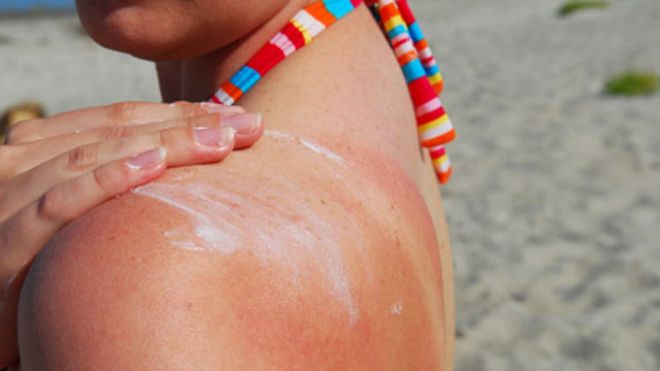Could you be allergic to the sun?
That’s right! It is possible to be allergic to the sun! Exposure to sunlight can trigger a variety of nasty skin conditions that affect one in five people. So who’s at risk? Being of a Caucasian or Native American descent may make having a sun allergy more likely, although correlation between skin color and solar skin allergies is still up for debate among researchers. Certain antibiotics such as tetracycline, sulfonamides and/or having eczema can increase the likelihood of sun-related skin problems. If you have a relative with allergic skin reactions to sun, then you are also at an increased risk. Sunlight can actually trigger hives, and those who are affected have red blotchy skin associated frequently with itchiness on sun-exposed areas of their body.  This tends to occur quickly, and in most cases, resolves itself in about a day.   Heat can also trigger hives, simply from an increase in body temperature.  Many of my patients who exercise, particularly when their immediate environment is very warm, or if they are “over-dressed,” find that these conditions may trigger hives and itchy skin. Another increasingly common malady is being allergic to your sunscreen. It generally occurs at the point of application of the product you are using, but it is more likely to appear on sun-exposed areas. The distribution may include your face but often spares affecting the eyelids.   Other less-common causes include a variety of autoimmune diseases, such as Lupus. In that case blood tests and/or a skin biopsy may help pinpoint the cause.  In some cases, sun allergy will manifest only when exposed to other triggers such as plants and/or fruits and vegetables. A solar-triggered rash may also have other symptoms including headaches, redness, hives and blisters. Clothing can provide significant protection as well as using an umbrella and a wide-brimmed hat.   Using a physical blocking sunscreen that generally contains micronized (almost invisible) zinc and/or titanium may be gentler on your skin, particularly if you have sensitive skin and/or allergic reactions to “chemical sunscreens.” Oral antihistamines can often reduce the severity of symptoms, although this is no guarantee! Other complementary treatments include topical steroid creams and, of course, avoidance of direct sunlight.   Don’t forget to reduce your outdoor direct sunlight exposure, especially between the hours of 11 a.m. and 3 p.m.   As always, work with a dermatologist and allergist to get proper advice and care for sun-allergy and photosensitivity reactions.Dr. Clifford Bassett is an adult and pediatric allergy specialist, and diplomat of the American Board of Allergy and Immunology. He is the medical director of& Allergy and Asthma Care of NY.& & Bassett is a clinical assistant professor of medicine and on the teaching faculty of NYU School of Medicine and NYU Langone Medical Center and assistant clinical professor of Medicine and Otolaryngology at SUNY LICH. Follow him on& Twitter. & source : http://www.foxnews.com/health/2013/06/06/could-be-allergic-to-sun/
